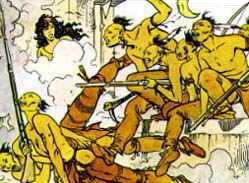Westerners provoked Indians, animals
Future PrimitiveWhen progressive estrangement from nature became outright social control (agriculture), more than just social attitudes changed. Descriptions by sailors and explorers who arrived in "newly discovered" regions tell how wild mammals and birds originally showed no fear at all of the human invaders (Brock 1981). A few contemporary gatherers practised no hunting before outside contact, e.g. the Tasaday of the Philippines (Nance 1975), but while the majority certainly do hunt, "it is not normally an aggressive act" (Rohrlich-Leavitt 1976). Turnbull (1965) observed Mbuti hunting as quite without any aggressive spirit, even carried out with a sort of regret. Hewitt (1986) reported a sympathy bond between hunter and hunted among the Xan Bushmen he encountered in the 19th century.
As regards violence among gatherer-hunters, Lee (1988) found that "the !Kung hate fighting, and think anybody who fought would be stupid." The Mbuti, by Duffy's account (1984), "look on any form of violence between one person and another with great abhorrence and distaste, and never represent it in their dancing or playacting." Homicide and suicide, concluded Bodley (1976), are both "decidedly uncommon" among undisturbed gatherer-hunters. The 'warlike' nature of Native American peoples was often fabricated to add legitimacy to European aims of conquest (Kroeber 1961); the foraging Comanche maintained their non-violent ways for centuries before the European invasion, becoming violent only upon contact with marauding civilisation (Fried 1973).


No comments:
Post a Comment